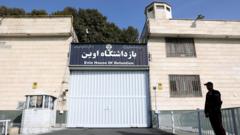In a recent social media post, President Trump pondered the reasoning behind not pursuing regime change in Iran, a notion at odds with his administration's official stance.
Trump Suggests Regime Change in Iran Amid US Strikes

Trump Suggests Regime Change in Iran Amid US Strikes
Trump hints at a potential leadership change in Iran following US military actions against its nuclear facilities.
US President Donald Trump has stirred controversy with his comments regarding Iran, speculating about the possibility of regime change following recent military strikes targeting Iranian nuclear facilities. This comes after the US partnered with Israel in a series of strikes aimed at curtailing Iran's nuclear ambitions.
On Sunday, Trump took to social media questioning, "Why wouldn't there be a Regime change???" His remarks have attracted attention, especially since other key US officials, including Defence Secretary Pete Hegseth, emphasized that toppling Iran’s leadership was not the objective of the military actions. Vice-President JD Vance echoed this sentiment, highlighting a divergence of opinions within Trump's circle.
During his presidency, Trump has been critical of overseas military involvement, notably the 2003 invasion of Iraq that resulted in the ousting of Saddam Hussein. In his recent post, referencing his campaign slogan "Make America Great Again," Trump expressed that if the current Iranian regime was unable to improve the nation, a regime change could be justified.
Amidst this, Elliott Abrams, a former envoy to Iran, cautioned that Trump's comments might only be hyperbole rather than a serious policy shift. The US strikes, which employed sophisticated munitions, were launched after an uptick in tensions following Israeli efforts to dismantle Iran's nuclear program. Both Netanyahu and Trump shared apprehensions regarding Iran nearing nuclear weapon capabilities, despite Iran's repeated denials.
The scale of damage inflicted by the airstrikes has yet to be fully assessed, with the UN nuclear watchdog calling for a ceasefire to facilitate inspections. In response, Iran reacted vehemently, promising severe consequences. By Monday, the Israeli military reported missile launches from Iranian territory toward Israel, retaliating by attacking multiple airports in Iran.
Currently, 40,000 US military personnel stationed in the Middle East are on high alert amid fears of retaliation from Iran. The US State Department has advised citizens globally to remain cautious. Furthermore, Iranian parliament has approved a potential closure of the Strait of Hormuz, a critical oil transit route that underpins significant global trade, with US Secretary of State Marco Rubio urging China to intervene.
As tensions escalate, Trump's actions have again reignited discussions regarding US military engagement, particularly with the implications of returning to "forever wars." Congressman Thomas Massie labeled Trump's involvement unconstitutional, arguing for the need for congressional approval when engaging in acts of war with other nations. He expressed concerns over the escalating conflict becoming an active military engagement, urging a reevaluation of foreign policy strategy amid growing anxieties on both Republican and Democratic fronts.
Meanwhile, the international community watches closely, with Iran's foreign minister visiting Moscow to discuss mutual challenges with President Putin, further complicating the geopolitical landscape in the region.





















